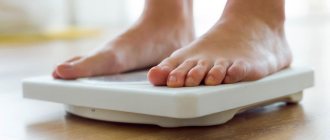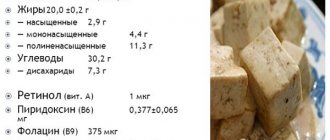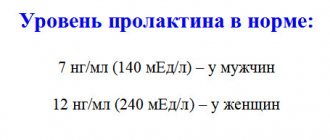From this article you will learn:
- Why do people gain weight faster as they age?
- Is it possible to lose weight from diuretics?
- How to lose weight for an elderly person at home
- What specific recommendations should you follow when losing weight?
- How to lose weight with diabetes
- How to lose weight with a sedentary lifestyle
Obesity is a problem faced by people of all ages, including the elderly. Excess weight, in addition to aesthetic and everyday inconveniences, creates additional stress on the body and can lead to serious diseases.
In youth, while the human psyche and body are flexible and resilient, you can experiment with heavy diets, physical activity and radical changes in diet. In old age, such extreme measures can undermine your health, so you have to look for other ways to lose weight. Fortunately, they exist, and now we will look at each in detail and look at the problem of excess weight in older people from different angles.
Why does it become more difficult to lose weight after 60?
The human body, like any flower, begins to fade over time. The aging process is taking its toll, but there is no need to despair, nutritionists are sure of this. You can and should focus on your own beauty and slimness at absolutely any age. By changing her habits, nutrition and lifestyle for the better, a woman will improve her own health indicators.
There are many influencing factors when it comes to losing weight and its difficulties:
- Lifestyle;
- bad habits;
- ways of spending leisure time;
- environment;
- stress.
Very often, a woman at 60 years old fails to lose weight due to the above reasons. All this can lead to weight gain or stagnation. Therefore, the first step is to get rid of unfavorable conditions.
During this period, some changes occur in a woman’s body related to women’s health and other anatomical features of a person:
- metabolic processes become slower, wastes and toxins are not eliminated by the body as quickly as before;
- weight becomes stagnant and difficult to get rid of;
- as a rule, a sedentary lifestyle predominates, which leads to the risk of stagnant diseases;
- along with general activity, processes inside organs slow down;
- the appearance and accumulation of visceral fat;
- tissues and bones become more fragile and vulnerable;
- serious hormonal changes.
Internal changes are quite natural and not as scary as they seem. However, they all lead to complications when losing weight. Stagnant fat deposits are much more difficult to remove. But nothing is impossible for a person, and nutritionists confirm this. Losing weight without harm to health is possible even after 60 years. The main thing is the right attitude and motivation.
How to safely lose weight for an elderly woman with diabetes
It is important for all women - young and old - to remain beautiful and attractive. Therefore, excess weight gained due to diabetes often becomes a serious blow to a woman’s appearance and self-esteem, and sooner or later she comes to the conclusion that it would be nice to lose weight.
There is only one non-drug way to reduce the concentration of insulin in the blood: limit carbohydrates in your diet. In this case, the process of processing fat reserves will return to normal, as a result of which the person will lose weight, and for this he will not have to starve or make additional efforts.
Low-fat or low-calorie diets are not helpful for diabetics because they do not reduce carbohydrate intake, which affects insulin.
In the 1970s American doctor Robert Atkins developed a new diet for everyone who wants to lose weight - low-carbohydrate. It was actively popularized in his book “The New Revolutionary Atkins Diet”, the ten millionth copy of which was quickly sold out, and in media appearances. Such a high interest of people in the diet was explained by its effectiveness. This book was published, among other things, in Russian and contains a number of tips, when followed, extra pounds will go away, and the risk of developing type 2 diabetes in an elderly person is reduced to zero.
Older women diagnosed with diabetes have certain difficulties with weight. The hormone insulin, which in healthy people reduces the concentration of glucose in the blood and controls its absorption by the body's cells, works differently in diabetics. In the initial stages of the disease, insulin resistance occurs - a condition when there is a lot of insulin in the blood, but the metabolic reactions of cells are disrupted, glucose is not processed by cells and its level in the blood is also high. Insulin also accelerates the synthesis of proteins and fats and acts as an inhibitor on enzymes that break down fats, resulting in the formation of fat reserves.
Women who want to lose weight in old age when diagnosed with diabetes need to be prepared for the fact that the results will not be noticeable soon. Only after a long time will insulin-lowering nutrition have its effect and weight will begin to decrease. By the way, physical education and regular age-appropriate exercise also help you lose weight, as they have a beneficial effect on glucose and insulin levels.
How to lose weight after 60 years?
When losing weight, it is important to understand that health must be protected. Therefore, there are several points that are worth paying attention to.
Firstly, the functioning of the stomach and intestines should be monitored.
Secondly, during a diet, sound and healthy sleep is extremely important; a woman is recommended to get enough sleep.
Thirdly, those who are losing weight should engage in physical activity. You don't have to join a gym and take the heaviest dumbbells. Nordic walking, walks in the fresh air and any other light cardio exercise are suitable as activities. In addition, they will have a beneficial effect on the condition of the respiratory system and heart function.

Nutrition should be moderate, overeating is excluded. The presence of a slight feeling of hunger will help speed up metabolic processes. You should take vitamin complexes that contain the minerals and nutrients your body needs. As a rule, diet after 60 does not require strict restrictions. Proper nutrition and exercise are the key to health and safe weight loss.
How to lose weight for an elderly person with a sedentary lifestyle
No one doubts the benefits of physical education, especially when it comes to gymnastics for older people. Such gymnastics should be regular and last at least 10-15 minutes daily. It may include breathing exercises, walking in nature and a standard simple morning exercise program, which is necessary to improve blood oxygen supply and train the body's muscles.
But, unfortunately, many older people have problems with mobility and cannot afford even light physical activity. However, even in this case, there is a way out for them: you can lose weight by changing your diet and removing high-calorie foods from it.
An elderly person should never starve or go without food for a long time! This will not help you lose weight! You should eat regularly in small portions, preceding each meal with a glass of water or a cup of green tea. This way of eating helps burn fat and improves blood composition. But here it is important not to overdo it with liquid: an elderly person needs about eight glasses of water (or other liquid) per day.
A person begins to lose weight when the amount of calories consumed is less than the amount spent. This happens even without additional physical activity. This seems to be the simplest way out: the less you eat and the less calorie-dense foods you choose, the less you weigh. But in practice, everything turns out to be somewhat more complicated: any diet and changes in nutrition are stress for the body, and the natural, genetically programmed reaction to stress in old age is precisely the accumulation of calories (and fat reserves in the body) for a rainy day. Therefore, an elderly person who suddenly goes on a strict diet risks gaining weight instead of losing weight. If it is not possible to adjust your weight through sports and gaining muscle mass, and you can only change your diet, then all radical options will definitely not work.
I would like to hope that this information will be useful to you and will protect you from mistakes in the field of weight loss. However, even if an elderly person failed to lose weight on their own, this is not a reason to despair and give up. The network of boarding houses for elderly people “Autumn of Life” has all the conditions and opportunities to help you lose weight to the desired weight. This includes medical supervision and carefully developed individual weight correction programs, care and adequate living conditions, and attentive attitude towards older people and their relatives. Helping older people solve various problems and making their lives rich and comfortable is our main task.
Basic principles of a healthy lifestyle
If you want to lose weight after 60, it is important to consider your body and health needs. Therefore, it is worth sticking to the basic principles of healthy weight loss in order to stay in good shape for many years to come.
- Diet. It is very important for the body to receive “recharge” at the same time of day. At the same time, the consumed portions should not be large. Eating should be done frequently - up to 6 meals per day. In this mode, despite the reduced portions, those losing weight will not experience a strong feeling of hunger. You can also have small fruit or vegetable snacks, they will also protect you from overeating.
- Reducing calories. If previously the usual diet contained a large number of calories in order to keep up with the rhythm of life, work and implement all plans, now it is necessary to reduce the energy reserves consumed. The fact is that life after 60 becomes more measured, and such high caloric intake is no longer required.
- It is recommended to exclude dangerous fats. Products such as lard, sausage, and fatty cheese should be removed from the diet. They may be tasty, but they cause great harm to your health and figure. They fill the blood vessels with cholesterol, interfering with the normal functioning of the heart and further inhibiting metabolism. Healthy fats cannot be removed: these include vegetable oils, which are mainly used in salads. They help the gastrointestinal tract and have a positive effect on the condition of the skin, hair and nails.
- There should be protein in the diet. This is the main material for the body to build various compounds. Its normal consumption will prevent skin sagging and sagging. In addition, protein has the ability to saturate the body. Even a small portion of meat will fill you up better than a double portion of carbohydrates.
- Minimize your intake of fast carbohydrates. These include all sweet baked goods, chocolate, sugar, honey and soft pasta. These foods cause a short-term spike in blood sugar, resulting in an energy boost. Such sugar surges after 60 are harmful to health, and short-term energy supply is not required. It is better to give preference to slow carbohydrates that will saturate the body for several hours.
- Despite the reduced need for water intake, it is necessary to drink enough fluids daily. For the age of 60 years, this volume is from 1 to 1.2 liters per day, including not only water, but also tea, fruit juice, juice and other drinks. At the same time, you should not consume more than the recommended norm; the urinary system should not be overstrained.
- Minimize appetite-increasing foods. It's no secret that to lose weight you need to eat less, but sometimes it's really not easy to do. In order not to provoke yourself to overeat, you should consume less dishes such as broths, mushrooms, smoked foods, and sauces. All of them cause a deceptive feeling of hunger, as they are appetite stimulants.
- To facilitate the work of all internal systems, nutritionists recommend arranging detox days a couple of times a week. These are days of fasting, when those losing weight consume easily digestible foods, making digestion easier. There are fruit, dairy, curd and other unloadings. This detox helps to get rid of accumulated “garbage”: waste and toxins that slow down metabolic processes.
- After 60 years, there is no need to get carried away with mono-diets. This is a type of diet restriction when someone losing weight eats the same product throughout the entire diet. There are buckwheat, rice, and watermelon mono-diets. This method of losing weight is dangerous; the body cannot get all the necessary nutrients from just one product. Such deprivations become more difficult to endure with age, which provokes various diseases.
It is recommended to follow these rules not only on a diet. You should strive to ensure that they become a habit of eating. This is a good chance to improve your health and take care of your own body without harming your digestion.
How to lose weight for an elderly person at home
Doctors agree that it is not only possible, but often necessary, for an elderly person who is overweight to lose weight. Excess body weight exacerbates chronic diseases and organ dysfunction, and often even becomes the cause of new diseases (which could have been avoided). But any elderly person trying to lose weight should be careful and consult with doctors so as not to harm themselves further. The safest option is hospital treatment, but not all older people can afford this.
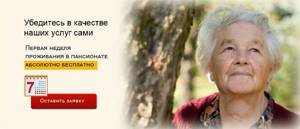
At home, an elderly person can also lose weight if he follows a few recommendations. The main principle is gradualism, that is, the absence of radical changes in diet and exercise. Measures such as frequent fasting days (more than two during the week), fasting, and express diets are definitely not suitable for older people. Losing more than 2 kg in a month is a noticeable stress for the body, which can lead to nervous breakdowns, metabolic disorders and many other vital processes. Therefore, an elderly person does not need to try to lose a lot of weight in a short time.
Read material on the topic: Nutrition for the elderly
An elderly person who decides to lose weight needs to pay attention to the following aspects:
- Diet . Make your food portions smaller than you usually eat. To prevent this from becoming a blow to the body and psyche, eat more often - five to six times a day;
- Method of absorption of food . Food must be chewed as thoroughly as possible so that it is better prepared for digestion in the stomach. Large pieces are processed more slowly, since it takes time for them to be saturated with enzymes, and create a greater load on the gastrointestinal tract, which can lead to diseases of the digestive glands;
- Method of cooking. It will be psychologically difficult to change established methods and technologies of cooking, since they have developed over years and decades, firmly becoming a habit and everyday life. Heavy and filling dishes such as bread, pasta, fatty meat soups, fried potatoes, dumplings, etc. are the main dishes in the diet for many older people. Those who decide to lose weight will need all the willpower and motivation to give up such dishes, replacing them with lighter, leaner and less calorie ones. But after some time, it will become easier for a person who goes on such a diet - the body adapts to food with a different calorie content, new eating habits will form;
- Optimal food . These are, first of all, vegetables that should be consumed daily by every person who wants to lose weight. But old age requires special ways of preparing vegetables, since fiber is poorly digested and absorbed in older people. Vegetables should be stewed, boiled, baked or eaten pureed;
It is best to choose the least fatty (or completely low-fat) dairy products. Some caution needs to be taken with them. Firstly, an excess of calcium can lead to increased leaching from the body. Secondly, many older people have milk allergies and problems digesting lactose. In addition, some researchers believe that consuming dairy products may lead to cancer.
A research team led by Betty Kaan looked at women diagnosed with early-stage invasive breast cancer between 1997 and 2000. All respondents lived in northern California. Scientists have found the following: those representatives of the fair sex who constantly consumed dairy products had an increased mortality rate from cancer. For those subjects who drank one or more cups of high-fat milk daily, the likelihood of dying from cancer in the next 12 years increased by 50%.
For an elderly person who has decided to lose weight, it is advisable to limit alcohol consumption and give up foods and dishes that stimulate the appetite: smoked, spicy and salty foods, sauces, mushrooms, fatty broths, fish.
- Water . The older a person is, the worse he feels his need to drink. For older people, the optimal volume of fluid per day is 1-1.2 liters (including both pure water and other drinks - milk, teas, juices, etc.). However, drinking too much water is also undesirable.
- Fasting days. In order to lose weight faster and more effectively, you can organize fasting days for yourself - fruits and vegetables, cottage cheese and kefir, meat, fish and vegetables. It is advisable to organize them from one to three times a week and alternate the menu, starting with higher-calorie dishes (meat and cottage cheese dishes) and moving on to light ones (dairy, fruit and vegetable). Fasting days help balance metabolism and prevent the formation of fat deposits, which ultimately makes it possible to lose weight.
- Physical exercise. They should be present in the life of any person, and if we are talking about older people trying to lose weight, then even more so. You may need to reconsider your rhythm of life and daily routine so that they include daily morning exercises (preferably in the fresh air), walks, exercise on exercise equipment (stepper, treadmill, exercise bike, etc.). The main thing is that the loads are regular and within the capabilities of an elderly person. You shouldn't exhaust yourself with heavy or long exercises either.
Read the material on the topic: Strong immunity in old age – it’s easy!
Active lifestyle and physical activity
Nutrition plays a vital role in weight loss. However, an active lifestyle and physical activity do not remain aside. Being active is important for your body at any age. Of course, there is no need to engage in exhausting workouts that can negatively affect your health. In addition, after 60, when children have their own family, you can devote time to yourself. Below is a list of recommended types of physical activity that are not harmful to the body:
- a ride on the bicycle;
- swimming in the pool;
- morning jogging;
- yoga;
- easy workouts in the gym with a trainer.
In fact, a trainer should be hired not only for gym classes, but also for other activities. The specialist will tell you which exercises should be selected based on the body’s capabilities, health indicators and endurance. In addition, the trainer will suggest the technique for performing the exercises, and the risk of damaging anything is reduced to a minimum. Also in nutrition, you should first talk to a nutritionist before creating your own diet plan.
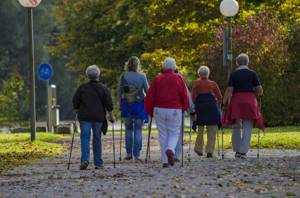
Refusal of stereotypes
A phrase like “excess weight is an inevitable accompaniment of the aging process” should be avoided by eradicating the habit of thinking negatively about your age and the associated changes in the body.
Often what hinders the achievement of a healthy weight is not some objective reasons, but negative thinking and attitudes that are harmful to the psyche.
Striving to maintain a healthy weight is important at any age. At the same time, you need to avoid extremes: having an extra 2-3 kg not only does not harm your health, but also has a protective effect, helping to cope with physiological stress, increasing endurance and immunity.
Post Views: 214
Advice from nutritionists
A person losing weight, although he is the master of his body, knows its features and how it functions, but sometimes he cannot independently choose the right diet for himself. The right decision would be to ask a nutritionist for help. He will be able to choose an individual nutrition plan and regimen. Below are the main recommendations of nutritionists for losing weight after 60 years.
- The size of the food eaten should not exceed 250 grams. Appointments are distributed throughout the day so that there are no “hunger” windows.
- Nutrition should not be monotonous. You need to please yourself in every possible way, and beautiful and tasty food will help with this. Plant components of dishes can lift your spirits and relieve depression.
- The basis of the diet should be fresh foods. Seasonal fruits and vegetables are richest in vitamins, which are so important for the body. At the same time, the calorie content of the dishes does not suffer from this; the more fruits and vegetables, the more benefits. In addition, “green” foods increase the speed of metabolic processes.
- Consumption of sugar and fat will have to be kept to a minimum. They are called catalysts for weight gain. They slow down metabolism, lead to stagnant processes and provoke the appearance of fatty plaques. Sugar should be replaced with healthy natural honey. And frying can be easily replaced by boiling or baking. Margarine and spread will have to be completely excluded from the diet, and animal fats will have to be replaced with vegetable fats, which, by the way, belong to the healthy class.
- It is important to maintain fluid balance. Dehydration is scary at any age, especially after 60. Due to a lack of clean water consumption, waste accumulates in the body, which is toxic and slowly poisons the body. Waste and toxins are eliminated naturally through the urinary system, so it is important to ensure that the body is hydrated.
Age-related features of the functioning of the body

After 60 years, age-related changes cannot be avoided. However, their speed and severity depend on whether the woman has bad habits, how active she is, how she eats, and cares for her skin. A large role is played by hormonal levels and the presence/absence of chronic diseases. Mental attitude is also important, because frequent stress worsens your general condition.
After 60 years, the following changes appear:
- Metabolism slows down; as a rule, there are already a number of chronic diseases affecting various body systems.
- The likelihood of chronic diseases of the gastrointestinal tract (gastrointestinal tract), for example, cholecystitis, gastroduodenitis, pancreatitis, etc., especially increases.
- Weight increases due to an increase in body fat, which is difficult to reduce.
- Due to decreased mobility, there is a risk of various diseases.
- The strength of the connective tissue layers in the joints decreases.
- Internal organs work more slowly.
- Hormonal changes negatively affect the functioning of the entire body.
Due to hormonal changes, a woman may become more sensitive to food. Many processes slow down, including the ability to self-heal and renew. Due to age-related changes and chronic diseases, the functional capacity of the liver and gall bladder decreases, and changes in their structure are possible. With age, liver tissue can be replaced by connective tissue, which increases the load on the organ, and changes in the wall of blood vessels are also observed. Often, by adulthood, there are already formed stones in the gallbladder - cholelithiasis develops. These processes also negatively affect the pancreas. And given that the tissues of the latter are often already partially replaced by connective tissue, the functioning of not only the digestive system, but also the entire body is disrupted.
Expert opinion
Evgeniy Kislitsa
Practicing surgeon. Certified massage master. Two-time vice-champion and heavyweight champion of regional kettlebell lifting competitions.
A disease such as cholelithiasis (GSD) leads not only to disruption of the gastrointestinal tract, but can affect all organ systems. The essence of the disease is the formation of stones in the gall bladder or bile ducts (usually extrahepatic). The danger of the disease is that stones can change their position and migrate along the bile ducts. And in the case when the diameter of the stone exceeds the size of the bile duct, the latter becomes blocked. A block is formed, due to which bile is not excreted into the intestines and accumulates in the biliary tract. Over time, inflammation develops and bile enters the bloodstream, beyond the biliary tract. This leads to the development of a number of complications, which without timely surgical treatment pose a serious threat to health. For example, biliary pancreatitis, a serious disease, can develop through this mechanism. In addition, general intoxication of the body occurs. Brain intoxication is especially dangerous.
How to create your own menu?
As a rule, by the age of 60 a person already knows exactly all the features of his body. It’s not difficult to choose a diet that suits your taste preferences. It is important that it is healthy enough and fulfills all the body’s needs for vitamins, nutrients and energy value. Recipes can and should be changed every week so that there is no boring monotony. Guidelines for choosing dishes will be the following conditions:
- fruits and vegetables should make up the majority of the diet, and their quantity should reach up to 1 kilogram per week;
- meat and fish - 150–200 grams;
- eggs and cheese can be consumed every other day;
- salads are seasoned with vegetable oil and lemon juice.
It is important to choose the dishes that the person who is losing weight likes. A diet for losing weight after 60 years for women should not bring discomfort, be a burden and worsen your mood. It is important to enjoy every day, and food can help with this.
Sample menu for a week when losing weight after 60 years
As mentioned above, dishes should be selected based on your own preferences. Therefore, it is not at all necessary to follow the example given; it is important to customize the menu for yourself.
Monday
- Breakfast: a portion of stewed vegetables and baked fish (350 grams), a glass of warm green tea;
- lunch: Greek salad and a piece of boiled meat, a glass of fresh orange juice and any fruit, such as an apple;
- dinner: cottage cheese casserole with raisins and dried apricots, a glass of low-fat yogurt.
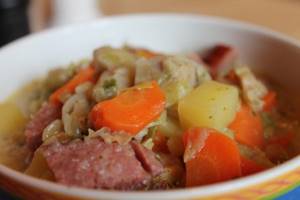
Tuesday
- Breakfast: a piece of boiled chicken fillet and a portion of buckwheat porridge, a fresh salad of greens and cucumbers, a glass of tea without sugar;
- lunch: vegetable broth soup, whole grain bread, pear;
- dinner: a glass of fermented baked milk, a small portion of cottage cheese with dried fruits, tea with soothing herbs.
Wednesday
- Breakfast: tender omelet with spinach, a glass of green tea;
- lunch: stewed lean meat with a portion of rice, vinaigrette salad and a glass of fresh apple juice;
- dinner: grilled vegetables, lavender tea and apple.
Thursday
- Breakfast: minced chicken meatballs, a sandwich with bread and cheese, tea with a spoon of honey;
- lunch: boiled chicken breast and a portion of baked vegetables, a glass of juice and any fruit;
- dinner: casserole with cottage cheese and raisins, tea with herbs.
Friday
- Breakfast: a serving of oatmeal with milk and honey, whole grain bread, a glass of green tea;
- lunch: vegetables baked with meat in the oven, a glass of juice and a baked apple;
- dinner: pumpkin cream soup, mint tea.
Saturday
- Breakfast: millet porridge with whole grain bread;
- lunch: a piece of baked fish fillet with potatoes, a glass of orange juice;
- dinner: zucchini pancakes and green tea.
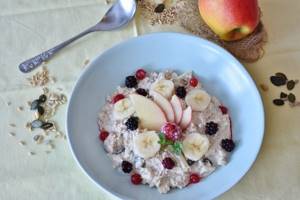
Sunday
- Breakfast: salad of tomatoes, eggs and onions, a glass of tea and a couple of slices of cheese;
- lunch: steamed chicken cutlets, vinaigrette salad;
- a portion of cottage cheese with a spoonful of sour cream, a glass of kefir.
It is important not to forget about snacks, since three meals a day are not enough. For a snack, it is best to choose fruit or diet bars. They will help you feel full and prevent overeating during a full meal.
Protein in the diet
With age, the need for protein foods increases. Such foods build muscle, promote rapid recovery, increase metabolic rate, and fill you better than carbohydrates and fats, reducing cravings for unhealthy foods.
You need to consume: lean meat, nuts, yogurt, legumes, sea fish, eggs, lentils, whole grain cereals, cottage cheese, pea flour, hard cheese.
Each meal (excluding snacks) should include 30 g of protein.




